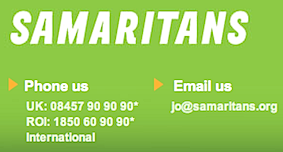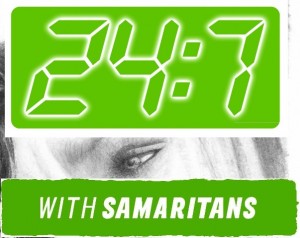Today is the 24th day of the 7th month and that is why it has been chosen by Samaritans as their main annual day of raising awareness of their service. I always thought of the organisation as "the Samaritans" but notice that now they seem to style themselves as Samaritans without the definite article. I'm not ashamed to say that I have called Samaritans in the past and think they're a worthwhile cause to support. I'm not going to say I recommend calling them right now this minute wherever you are. Just bear them in the back of your mind.
I've come up with ten reasons why I think the Samaritans are a beacon of sense and humanity in a world crowded with helplines and awareness groups.
1. 24/7
Like it says on the tin, the Samaritans really are there 24 hours a day, 7 days a week, 365 days a year. While the centres are open for anything up to ten o'clock at night, there is still always some-one in the building to answer phones in the middle of the night.
2. Confidentiality
Whatever you say to Samaritans stays within the organisation. Volunteers are forbidden from divulging information about callers. They're not going to call your mother, or your spouse, or your GP. They're not the thought police and won't shop you for disclosing suicidal thoughts or even plans
3. Non-directional support
This ties in with number two. The Samaritans believe adults are responsible for themselves and do not tell callers what to do. This holds true for the big decisions in life, such as whether or not to leave a spouse or partner, as well as the small things, such as should I go home for the weekend? The impulse to offer advice is very strong among humans, and some people attract it like a magnet. I spent years of my life being told what I should do, by my parents, my siblings, my doctors, my friends, fellow patients, people on the bus and even the guards. There's nothing wrong with wanting to help people but the thinking necessary to formulate advice can inhibit empathy. The advice-avoidance also recognises that the volunteer and the caller are equals. Neither is an expert on the other's life.
4. Variety of Contact Options.
 The phone is the best known option for contacting the Samaritans but they also run an email and text service. While I can see the point of emails, I'd be a bit ambivalent about the value of the texting service. I'm sure they thought it out before they introduced it but wonder how much emotional connection you can cram into 160 characters. There are twenty centres around the country that are open for most of the day. Imagine; a person can walk in off the street and sit down with a real, life person who'll sit with him or her, listen, connect and impose no kind of conditions and charge no fee.
The phone is the best known option for contacting the Samaritans but they also run an email and text service. While I can see the point of emails, I'd be a bit ambivalent about the value of the texting service. I'm sure they thought it out before they introduced it but wonder how much emotional connection you can cram into 160 characters. There are twenty centres around the country that are open for most of the day. Imagine; a person can walk in off the street and sit down with a real, life person who'll sit with him or her, listen, connect and impose no kind of conditions and charge no fee. 5.Diversity
I don't have figures available but from what I know the Samaritans recruit both men and women, gay and straight, across as wide a social spectrum as possible. Not only is the organisation itself diverse but it recognises and respects diversity in its users.
6. Responsible Marketing
I once emailed the Advertising Standards Authority about an Aware campaign that stated how many had died in Ireland by suicide the previous year and exhorted listeners to send them money and "stop this pain". It reminded me of the American magazine that in the 1980's had an issue with a puppy on the cover and the headline "Buy This Magazine or We'll Shoot the Puppy". In recent years I've heard radio ads for other helplines that include dramatisations of families hearing the news that their son has taken his own life. There is also the indirect marketing whereby some organisations write articles for newspapers or sites like www.thejournal.ie hyping up the "epidemic" of mental health problems among young people or among men. In contrast to these, the Samaritans explain the nature of their service and never claim that their service "saves lives" although they hope, indirectly, that it does.
7. Listening
The Samaritans' core value is listening. In a complex, fast-based world it is easy to underestimate the importance of something so simple. Listening sounds like a passive activity, but can be extremely powerful.
8. Independence
The Samaritans won't diagnose you with any kind of health problem. They're unaffiliated to the mental illness industry. This is perhaps the most common misconception about them; that they're a mental health charity who offer support to those with mental health issues or who work to promote mental health. They do no such thing. When I called the Samaritans I was never asked had I taken my medication or told that I was catastrophising or that that my brain wasn't working. They just listened.
9. You Don't Have to be Suicidal
There's a sign up down the post office with a number for the HSE that you're supposed to ring if you're suicidal. Presumably so they can talk you out of it. I've always kind of looked at it funny, thinking, from my own experience that if you're suicidal you're unlikely to call some-one whose paid job it is to stop you. The poster also implies; don't call us unless you're suicidal. We don't want to hear about your pain, or your grief, or your disappointment or how you feel life's been unfair. We just care about bringing down the numbers because they're making us look bad. The Samaritans' "here for everyone" approach takes the heat out of the situation. There's no drama. You just call.
10. Normality
In the end, I did struggle to come up with ten reasons. I'm going to pick normality for my last one. There are 2,188 current volunteers in Ireland, who are normal people from all walks of life, not purported experts. They got 412, 167 calls and visits last year. We live in a world where emotions and painful feelings are increasingly pathologised. We also have more and more of what Robert Putnam calls "bonding" or special interest groups, but fewer "bridging" groups where that bring people together based on location. This can lead to splintering, and the fear of being different can become the belief that one is abnormal. In all their work, the Samaritans stress the normality and universality of human emotions, although our stories and prolems can indeed be unique to us.
Contact Samaritans on 1850 60 90 90 or email jo@samaritans.org

No comments:
Post a Comment